‘Disturbing’ force used at Fresno homeless shelters by private security. Here’s what happened
Between 2019 and last fall, the city of Fresno alone has invested more than $53 million to acquire, convert and pay contractors to operate nine former motels — located west of Highway 99 in a blighted area known as Motel Drive — as emergency shelters and transitional housing for the unhoused.
Independent shelter operators that run the converted shelters then hired private security — primarily through a company called Pacific Valley Patrol — to ensure that only current shelter residents, not the surrounding unhoused population or other unauthorized individuals, enter the premises.
Presumably, the intent is to protect shelter residents and prevent crime from occurring on the property.
But a Fresno Bee investigation — based on nearly two-dozen interviews with shelter residents, former security guards and homeless advocates, and a review of police reports and other public documents — reveals disturbing examples of use of force by the security firm that is enabled, in part, by a lack of oversight by city officials, shelter operators and the local housing authority.
Among the findings:
Four former guards said they were told to “(pepper) spray first, ask questions later” through the course of their work with the homeless
A shelter visitor said he was pepper-sprayed while waiting at an adjacent property for not leaving the shelter vicinity quickly enough
A shelter resident said that a security guard knocked down her door in the middle of the night
Shelter residents and other unhoused individuals often don’t know where to turn to file grievances against the security company
The city’s contracts place all responsibility for any subcontractors, such as private security, on shelter operators
The city of Fresno, unlike Fresno County, failed to provide any specific guidelines for the actions of contracted private security guards
“It seems that the security has begun to believe that they may be like some kind of prison yard f---ing C.O. (corrections officer),” a shelter resident named Timmy said during public comment of a June 23 Fresno City Council meeting.
Pacific Valley Patrol Chief Executive Officer Cristiano Lopes declined multiple requests from The Fresno Bee to comment on this story or on the specific findings of this investigation.
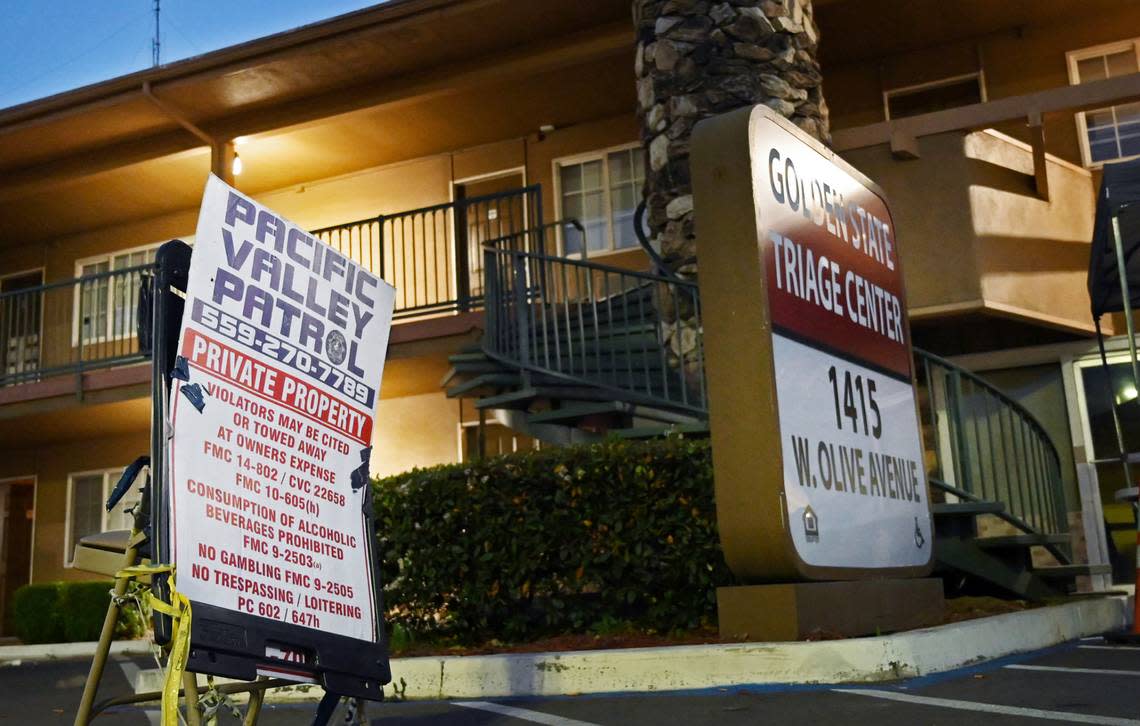
Fresno shelter operators have spent at least $2 million on private security at the shelters between January 2021 and November 2022, based on limited monthly budget and contract information examined by The Bee. The exact amount of public funds spent on private security is unknown because detailed financial information hasn’t been made public.
Despite the public investment in the shelters, city officials have largely ignored specific questions about security concerns. When asked who is responsible for reviewing use of force incidents involving city-subcontracted private security firms, leaders referred The Bee to the shelter operators who hired the security company. These are private entities that are not subject to public oversight.
The city of Fresno, which owns five of the shelters, answered some general questions about shelter contracts and funding over email.
In a September 2022 email statement, city of Fresno spokesperson Sontaya Rose said the city has made housing the homeless a priority and that being safe and secure is “important,” especially in “an environment that fosters growth and positive transformation.” However, she said the city does not hire the security companies that oversee these properties. Rose refused The Bee’s subsequent October 2022 request for an interview with relevant city staff for this story regarding the city’s existing contracts with shelter operators, citing the lack of a direct contract with Pacific Valley Patrol.
The city of Fresno has an agreement with public housing agency, Fresno Housing Authority, to fund property and case management services at four of the state-funded Project Homekey shelters owned by the housing authority near the Parkway Corridor. A spokesperson for the Fresno Housing Authority answered general questions over email, but didn’t comment on specific findings.
In response to request for comment on The Bee’s findings in this story, Tyrone Williams, chief executive officer for Fresno Housing Authority, issued a Sept. 7, 2022, email statement saying FHA is “committed to the safety of our residents, staff, and community” and is working with their partners to “enhance the safety and services in the neighborhood.”
The Fresno Housing Authority has contracted with nonprofit Turning Point for Central California to manage day-to-day operations at the shelters. Meanwhile, the city of Fresno contracted Turning Point, RH Community Builders and their new non-profit arm, Elevate Community Services, to manage city-funded shelters. These shelter operators then subcontracted Pacific Valley Patrol to provide security services.
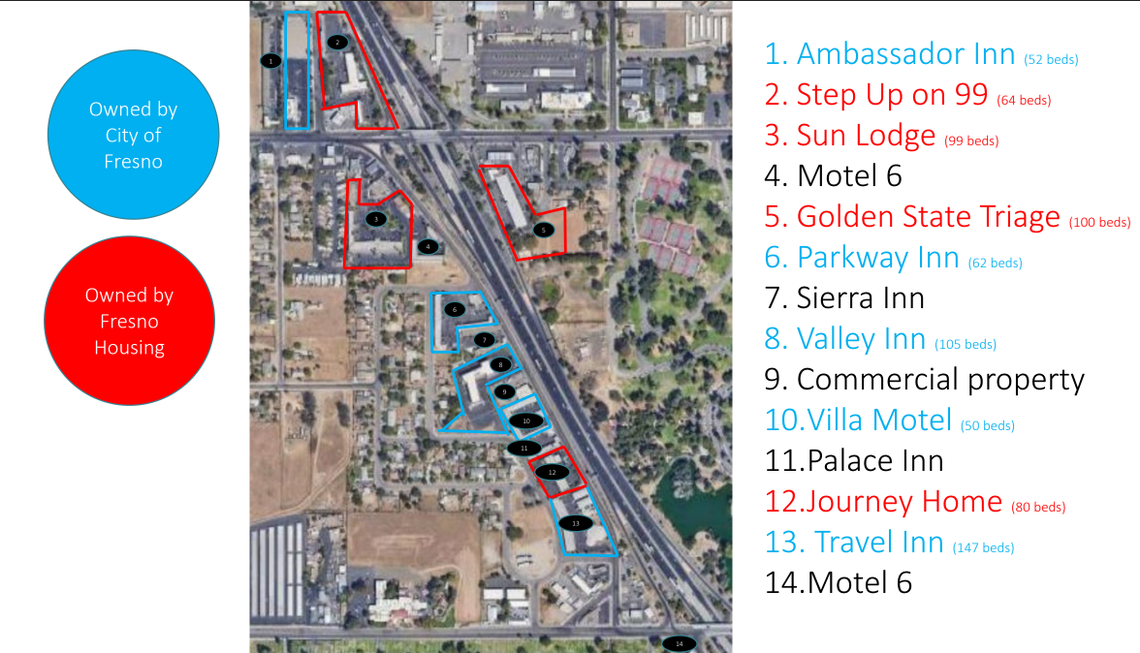
Turning Point’s Regional Director Jody Ketcheside declined to comment for this story.
Katie Wilbur, executive director of RH Community Builders and Elevate Community Services, responded to general questions about shelter operations and security services over email but did not release information about specific grievances involving private security guards, saying this information was confidential to ensure clients do not fear retaliation.
The shelter operators’ hands are tied, in part, due to city contract language that binds them to confidentiality and prevents contractors from giving reports or data to outsiders without express permission.
The Bee asked to review the contracts that shelter operators hold with Pacific Valley Patrol, but the city and the housing authority said they do not possess copies of these contracts.
The Bee submitted six separate public record requests for any communication or information that mentions Pacific Valley Patrol to the city, Fresno Police Department, the Fresno Housing Authority and the state of California. These agencies said they either didn’t have any relevant communications or they wouldn’t release it. The private shelter operators and security companies are not directly subject to public record laws.
Councilmember Miguel Arias, who represents District 3, where the shelters are located, said in multiple interviews that he recognizes that the city’s attempt to house the homeless during the COVID-19 public health emergency had its shortcomings — including shelter security. He said the city is still new to providing services for the homeless, something that has “always been a county function.”
“When we started sheltering the homeless, we accounted for food, for electricity, water, sewer, for beds, for clothes,” he said in a May 2022 interview with The Bee. “Security was not part of the initial conversation.”
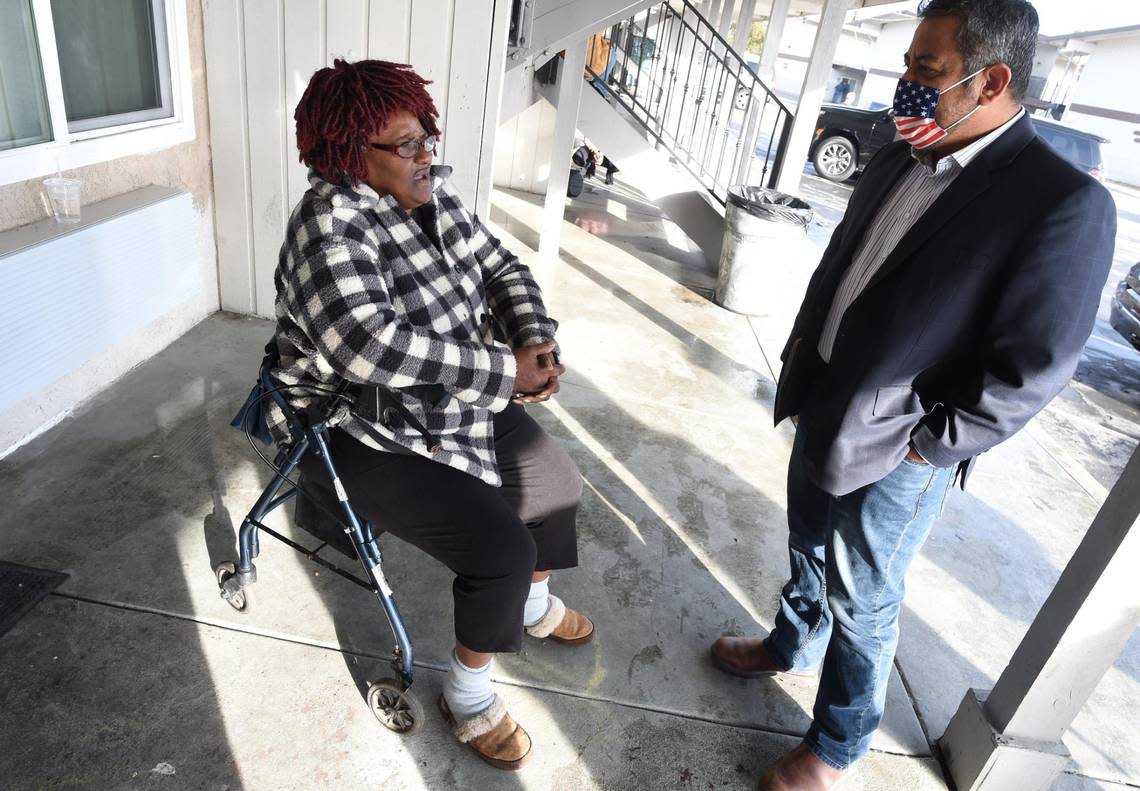
‘Spray first, ask questions later’
Four former Pacific Valley Patrol security guards who worked at the city’s shelters said that they were encouraged by their boss, Lopes, to use force, namely pepper spray, against shelter residents and nearby unhoused individuals when they felt threatened.
The guards said they were instructed to “spray first, ask questions later.”
Again, Lopes declined to comment on this story.
But one former guard, Warren Hicks, said, “he (Lopes) uses it like hairspray.”
Hicks said that on one occasion a shelter resident at the former Travel Inn and Suites — a man whom Hicks said appeared to be suffering a mental disorder — tried to spray him with the insecticide Raid.
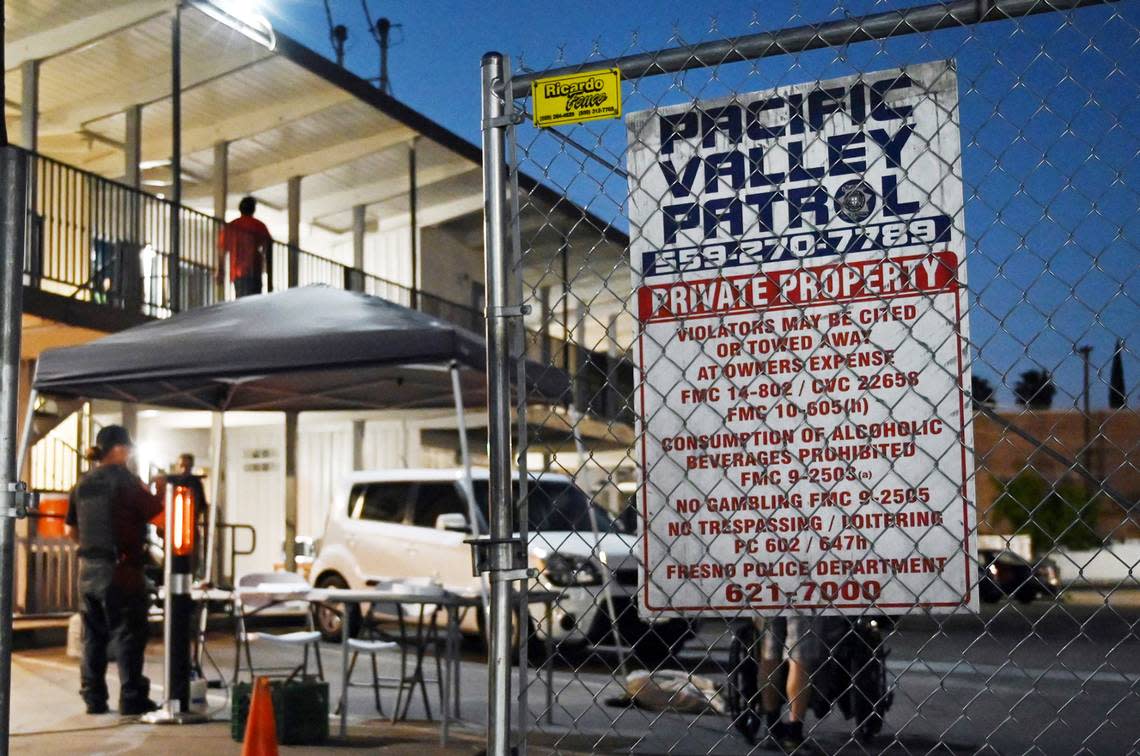
In response, Hicks said Lopes told him to “spray him with Mace.”
Hicks – who has prior experience working security at a mental health hospital – said he didn’t think it was necessary. Instead, he said he “ducked” to get out of harm’s way and detained the man until shelter staff decided how to proceed.
State private security standards say private security guards should only use pepper spray as a “defensive response” under “justifiable” circumstances.
Hicks said that sometimes, such as when someone had a weapon or when intervening in domestic violence situations, he felt the need to use pepper spray. Otherwise, he tried to avoid using the defense tool because “it’s a liability.”
Aggressive use of force wasn’t the only concern the former guards raised. Five of them also said they were discouraged from calling the police for backup even when they felt it was necessary. Two former guards said they were even instructed to act like the police.
“He would tell certain guards like me that ‘you don’t call PD; you get them (non-residents) off (property),’” Hicks said.
Another former guard who spoke with The Bee on condition of anonymity due to fear of retaliation, said “he (Lopes) always wanted you to be a ‘pit bull,’ be aggressive. Ask questions later, but get the job done first.”
Experts in the field told The Bee that approach is problematic.
In an interview with The Bee, David Sklansky, a criminal justice and private security expert at Stanford Law School, reacted to the allegations that Pacific Valley Patrol tells its employees to act like they’re police and “spray first, ask questions later.”
“If that’s the perception of what the police do,” he said, “that itself is really troubling.”
There’s a key difference between private security and a public police force, said Joseph Jaksa, a professor of criminal justice at Saginaw Valley State University with decades of experience working in the private security industry, in an interview with The Bee.
“For all the problems with public policing,” Jaksa said, “there’s at least some level of transparency.”
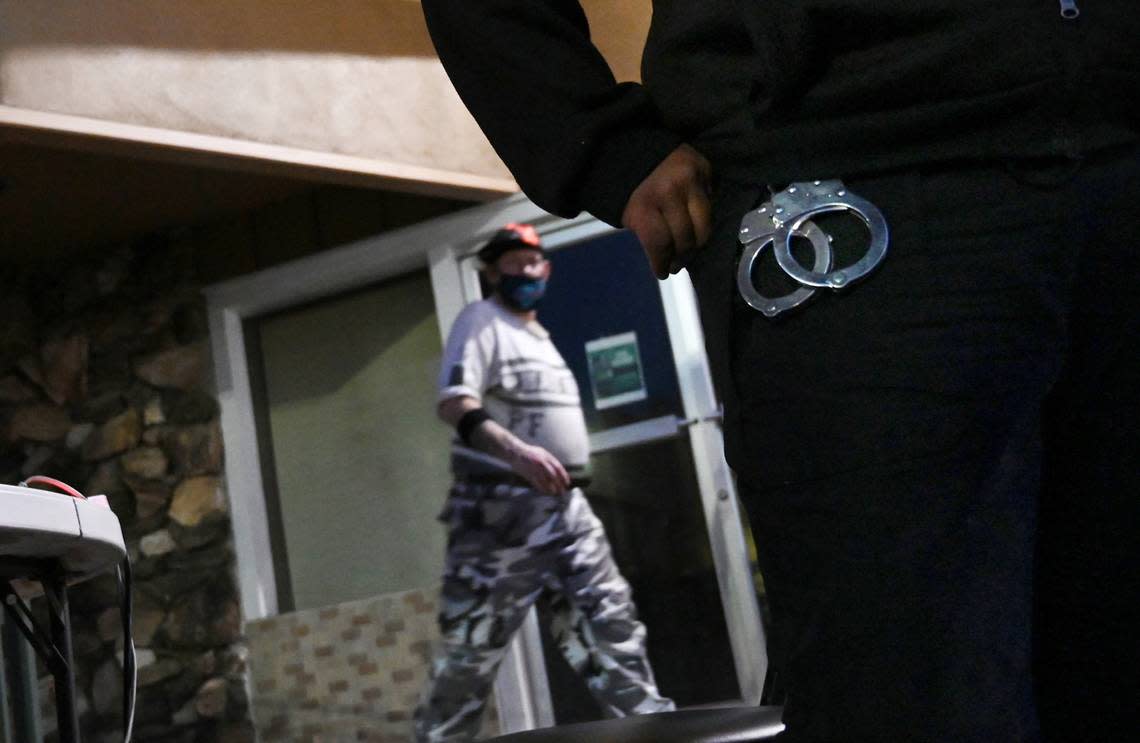
Shelter visitors pepper-sprayed outside premises
Abel Martinez, 36, arrived at the Sun Lodge Triage Center, a state-funded Project Homekey shelter at the former site of the Days Inn, on an early morning in October 2021 to pick up his girlfriend and former shelter resident, Emily Padilla.
Shelter rules prohibit guests from visiting the rooms, unless they are medical or support staff, according to a Turning Point of Central California handbook obtained by The Bee. (Turning Point was contracted by the housing authority and the city to run the Sun Lodge.) All other visits, such as friends or family, must take place off site due to space constraints.
“I wasn’t trying to go in ’cause I knew already I couldn’t,” he said. Martinez didn’t have a cellphone at the time to contact Padilla, so he asked a Pacific Valley Patrol security guard at the shelter entrance to knock on her room door.
But the security guard refused, Martinez said. So he tried to yell and honk his car horn in a vain attempt to get his girlfriend’s attention. Martinez said the guard told him he couldn’t be there, and that they’d have to call the police if he didn’t leave.
After a verbal exchange in which Martinez told the guard he was technically on Denny’s property next door, Martinez said he finally decided to leave.
But things took a turn for the worse.
“As I go to leave,” he said, “I put the car in gear, he (the security guard) reaches into the passenger window and he pepper-sprays me.”
“According to him, he thought I was reaching for a weapon,” Martinez said. “I had to drive my car back to my mom’s house, barely able to see, barely able to breathe.”
Martinez’s girlfriend, Padilla, said she had been asleep when the incident took place outside of the shelter that morning. When she learned what happened later that day, she said she went to visit Martinez at his house.
“Sure enough,” she told The Bee, “he was all red, and his skin looked irritated.”
Jaksa, the professor of criminal justice, said it sounds as though private security guards at the Fresno homeless shelters are “using the bouncer mentality,” as if they were guarding the entrance to a bar or nightclub.
“There is never a good time for this mentality,” he added.
But that’s not the only problem. Jaksa said if the guard did step off the shelter property to pepper-spray the man, no sort of liability insurance would cover the incident, in theory.
“Their authority is the property line,” he said. “It’s not as a police officer where you’ve got the whole city to protect.”
Any use of force is to be reported to the state of California’s Bureau of Security and Investigative Services – the state agency that oversees security company licensing. But at least one former guard doesn’t think the company was always compliant with this rule.
“You have to do a whole lot of paperwork if you use pepper spray on somebody,” said former Pacific Valley Patrol guard Alec Gonzales. “A lot of them (guards) don’t want to deal with that.”
It’s not clear whether an incident report was filed in this case.
The Bee submitted a public records request to the BSIS to obtain details on incident reports filed by Pacific Valley Patrol, as well as any complaints of the company. But the BSIS declined to release any records, saying it “will not waive its discretionary authority” because doing so could compromise current or future investigations.
Padilla, the former shelter resident, said she called Lopes, head of Pacific Valley Patrol, and left him a voicemail complaining about her boyfriend getting pepper-sprayed, but she didn’t receive a response. The couple considered filing a police report, but Padilla said they never got around to it.
‘Fresno PD doesn’t even do that’
Shelter residents and advocates have also complained that guards have used force within the shelters.
Around 3 a.m. on Jan. 7, 2022, Rebekah Ernest got out of bed, opened her room door at the Sun Lodge Triage Center, and pleaded with her neighbors to quiet down, she said.
Ernest said she had a hard time sleeping in the shelter because her neighbors were up all night, making noise.
Then, she “slammed” her door and walked toward her bed to “try to go back to sleep,” Ernest told The Bee in a February 2022 interview.
Suddenly, Ernest said a shelter staff member came to her door and yelled, “B---- open the door!” She refused. As a petite, older woman, Ernest was “terrified” for her physical safety, according to Cindy Piombino, a homeless advocate with Christ’s Helping Hands Ministry, who frequently visits her clients at the city’s shelters.
The staffer continued yelling through the door, telling Ernest she was “tired” of her “sh--,” according to a Fresno Police report obtained through a public records request. Then, Ernest, who was on the phone with the police, said, “they are kicking the door now.”
At the direction of a Turning Point of Central California employee, a Pacific Valley Patrol security guard kicked the door in, “literally off the hinges,” according to Piombino, who arrived at the shelter about an hour later at Ernest’s request. The police report confirmed the security staff had “kicked the door into” the “motel” room.
Piombino said it was “disturbing” that a security guard, at the direction of a nighttime employee, would knock down the door “without even contacting his superiors or anything.”
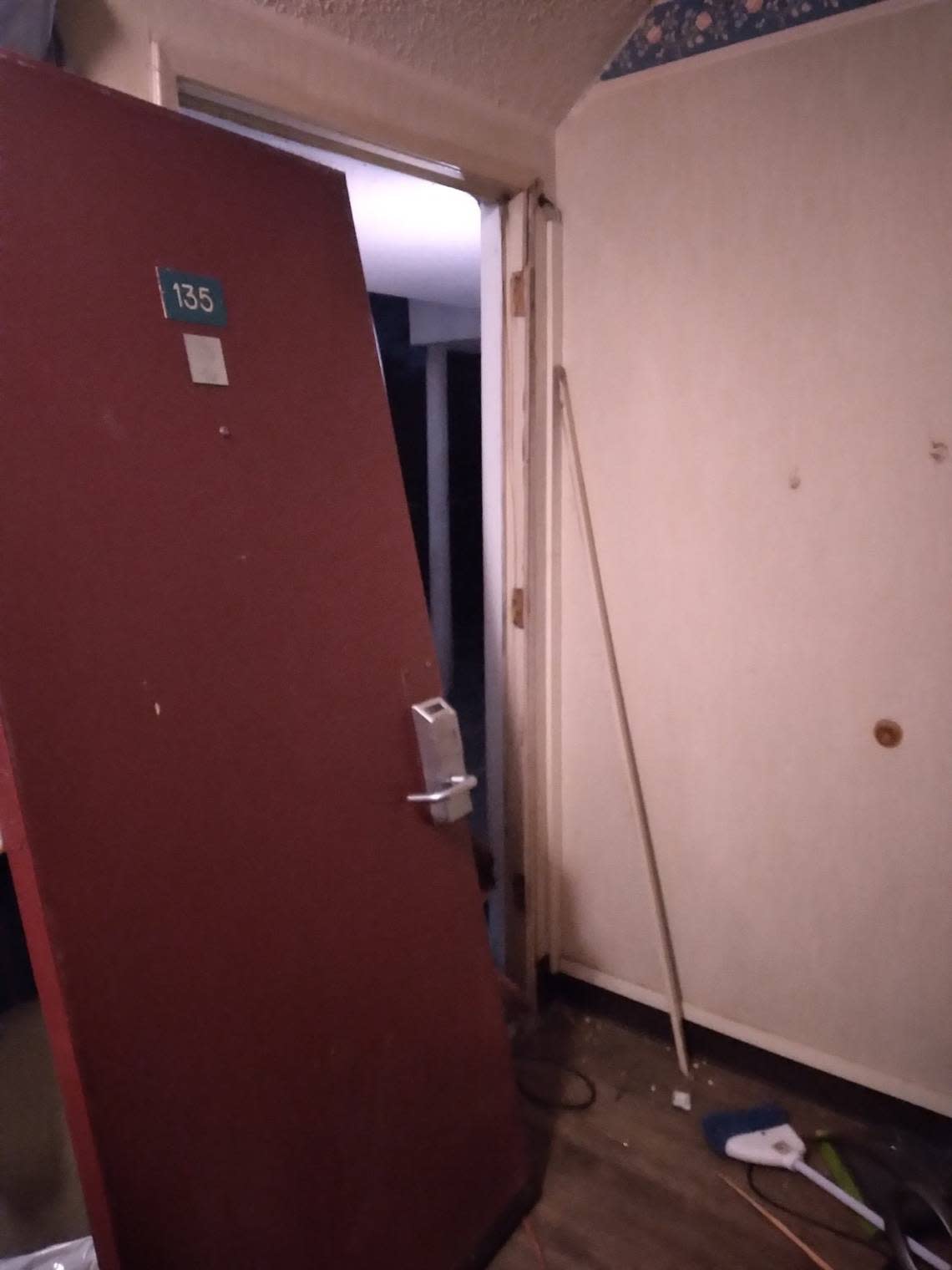
“Fresno Police Department doesn’t even do that,” she said. Later, Piombino said Turning Point shelter staff told her they wanted to do a “wellness check” on Ernest.
Turning Point’s Regional Director Jody Ketcheside declined to comment on this story. But in a Jan. 7 2022 email to Piombino, Ketcheside stated, “Unless there is an emergency, we would never advise security to kick a door in.” Ketcheside also told Piombino that she would “deal” with shelter staff, but didn’t disclose specifics.
In February, Piombino filed a complaint based on the incident with the state Bureau of Security and Investigative Services and received an automatic email reply acknowledging receipt of her complaint.
But nearly a year later, Piombino has not received any other response.
What city contracts say about security
Beyond requiring security guards comply with state standards, the city has no publicly documented expectations for how guards should act at shelters.
While not a direct reference to private security, most of the city’s contracts require shelter operators and any subcontractors to “perform in accordance with the standards of said profession.” It’s unclear how this is enforced.
Two expired contracts between the city of Fresno and Turning Point for security at Step Up on 99 and Sun Lodge — the shelter where Ernest’s door was knocked in — say that a security guard will be on post 24 hours, seven days a week.
The two contracts — the only to contracts specifically to fund private security services — have vague language that “special need(s) can be provided upon request” and also stipulates that daily reports and incident reports be provided.
But when The Bee, through a record request to the city, asked for any communications related to Pacific Valley Patrol, the city declined to produce any communications responsive to this request, saying the request was “overbroad or unduly burdensome.” The City also objected to this request on the grounds that “the public interest served by not disclosing such records clearly outweighs the public interest served by disclosure of these records.”
Sun Lodge has since been vacated and torn down. In August 2022, Fresno Housing Authority broke ground on Promesa Commons, a permanent affordable housing project that will be built on the site of the former shelter.
The city of Fresno could take a more active role in private security oversight.
According to the city’s contracts with shelter operators, the city risk manager has the discretion to require separate side agreements with subcontractors, such as Pacific Valley Patrol, which would allow for more accountability.
Other local public agencies have already taken these measures.
According to invoices obtained by The Bee, when Fresno County, not the city, hired Pacific Valley Patrol – for a total of $800,000 for two years – to provide security services at the converted temporary emergency shelters, their contracts outlined specific expectations.
Some of these specified duties included regular perimeter checks, assisting staff with disruptive or problematic clientele, and instructions to help county staff handle “minor hostilities” and other matters in a “courteous and respectful manner.” The county contracts also required verbal and written incident reports from the security company.
Homeless advocates call for action from city
Shelter residents and homeless advocates have raised concerns about the security operators to city leaders during multiple city council and Fresno Housing Authority public meetings.
Piombino told The Bee she thinks Pacific Valley Patrol “should lose their contract(s).”
She’s not alone.
In a Feb. 10, 2022 Fresno City Council meeting, Fresno homeless advocate Dez Martinez criticized the company owner by name and asked the council to “get another (security) contractor.”
In a similar vein, Fresno resident Lisa Flores called on the city of Fresno, the city manager, the city attorney and Fresno Mayor Jerry Dyer “to suspend, investigate and terminate the contract for Pacific Valley Patrol” following concerns raised about the company.
Advocates for the homeless and security experts agree some measures could be taken to alleviate the problems. They believe more trauma-informed training on how to work with vulnerable populations such as the unhoused and mentally ill, as well as better oversight in written contracts, are some ways the city could play a more proactive role.
Jaksa, the private security expert, said while he understands that security oversight wasn’t top of mind during the height of the coronavirus lockdowns and stay-at-home orders, the city and shelter operators should review security responsibilities now that the public health crisis has subsided.
“The city,” he said, is “going to be in the crosshairs if something happens.”
City leadership so far hasn’t taken any obvious action to address security concerns.
In response to The Bee’s questions about whether the shelter operators and security need more oversight, Arias said he has proposed an audit of all the city’s homelessness investments. The audit would measure effectiveness of its housing strategies including its shelters and report findings to the city council’s Finance and Audit Committee.
The city’s investments in homelessness, Arias said, are “at the top of the list” for an audit. But as of the last audit committee meeting in October 2022, no audit has been scheduled.
State leaders also appear to be aware of the problem of private security use of force – and legislation was passed that could help prevent such abuses of power in the future.
In 2021, Gov. Gavin Newsom signed a law that, as of Jan. 1, 2023 requires the BSIS to develop a curriculum and mandatory training courses on the appropriate use of force and powers of arrest, including training related to mental health and interacting with people with disabilities or behavioral health issues. The law also beefs up reporting requirements for when guards use force.
Still, advocates for the homeless warn the problem of private guards’ use of force persists – and extends beyond Fresno.
Anthony Prince, president of the California Homeless Union, a community-funded organization that serves the unhoused community, said his organization is monitoring the use of private security at publicly funded shelters throughout the state.
“You’ve got a lot of people who are in these organizations that have reputations for excessive force,” Prince said, “and there’s very little control over their conduct.”
